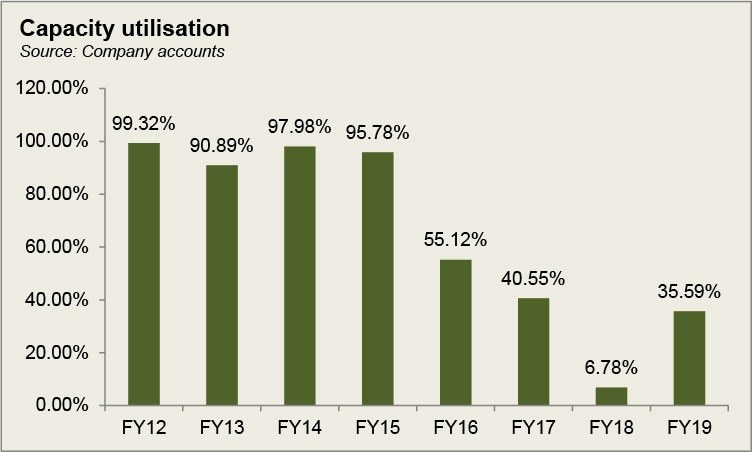Chakwal Spinning Mills Limited (PSX: CWSM) was established as a public limited company in 1988 under the Companies Ordinance 1984. It is in the business of textile spinning and manufacturing quality yarn from raw cotton and synthetic fiber. Located in District Kasur, the company started off with an initial capacity of 14,400 spindles; subsequent to the process of modernizing, it increased its capacity to 33,468 spindles.
Shareholding pattern
At 78 percent, more than 50 percent of the shareholding of the company is with the directors, CEO, their spouses and minor children. Of this, 50 percent is held by Mr. Khawaja Muhammad Kaleem, an executive director of the company. A little over 20 percent is distributed with the local general public, while the remaining 2 percent is with the rest of the shareholder categories.

Historical operational performance
The company saw more than 20 percent decline in its revenue consecutively for five years, from FY14 to FY18, unsurprisingly leading to losses.

In FY15, the revenue reduced by a little over 22 percent; local sales and export sales, both witnessed a notable drop in their numbers. This was attributed to lower prices offered by the Indian exporters, which led demand away from Pakistan. Secondly, the rupee gained against US dollar which further made exports uncompetitive in the international market. In the domestic market as well, the decrease in raw material prices led to an even further drop in sales price leading to lower margins. Costs stood at 98 percent of the revenue, leaving very little room for absorption of other costs. The main drivers of costs were raw material and fuel expenses. Thus, the company saw a loss of Rs 140 million.

There was a drastic drop in sales revenue of 50 percent in FY16, owing to a fall in export sales; the latter fell to Rs 123 million from Rs 993 million in FY15. This was as a consequence of a low demand of yarn in the international market. In addition, prices for yarn also fell, leading to a further loss in revenue and margins. Due to low demand in the international market, the product was directed towards the domestic market. This created a situation of over supply which drove down prices in the local arena as well; thus, eroding margins. Costs went further up in response to increase in raw material prices, minimum wages and high tariff of energy cost, thereby aggravating losses.

Revenue nearly halved year on year during FY17. The company was still experiencing the effects of sluggish demand in the international market as well as the local market. Capacity utilization was recorded at below 50 percent. “Imposition of innovation taxation on energy sector put immense pressure on local spinning industry which resulted in closure of many spinning mills, particularly in the province of Punjab”. With such a significant drop in revenue, and the existent business environment, the company also shut down operations for some period during the year. Thus, fixed costs could not be absorbed which led to losses swelling to Rs 356 million- the highest seen since FY17.

Revenue fell to an all-time low in FY18 as it was recorded at Rs 201 million. Export sales were already non-existent since last year; local sales also dropped to Rs 197 million during FY18. Due to heavy losses the company closed it operations at the end of the third quarter of FY17 and leased its production facilities to Yousaf Weaving Mills Limited. The lease arrangement has been elapsed since March 31, 2018. With a tough environment and contraction in the business activity, margins, although remained negative, however, the losses were lower than last year.

Upon the expiry of lease arrangement, the company was back on track as was reflected in its topline which grew to Rs 1 billion in FY19. With export sales still absent from the scene, local sales were largely responsible for the increase in revenue. As a result of currency devaluation and the resultant inflation, cost of production consumed nearly 100 percent of the revenue, which was lower than that seen in the last two years. Despite improvement in sales revenue, the company incurred a loss in FY19, however it was significantly lower than previously seen.
Quarterly results and future outlook
for its latest available financial performance i.e. 1HFY20, the company posted a 70 percent year on year decline in revenue. This was attributed to cancellation of textile being a zero-rated sector. In addition, due to the imposition of sales tax, sales to unregistered people were adversely affected. Since the company has not been exporting, sales in the domestic market has largely been its source of revenue. Currency devaluation also heavily impacted cost of production.

As the company is affected by currency devaluation, which was relatively seen more in the last month of the third quarter of FY20, it can be said that costs can cripple the topline. In addition, the repercussion of Covid-19 could be more severe for Chakwal Spinning Mills since its revenue is already limited to the domestic market, which has seen reduced business activity.
























Comments
Comments are closed.